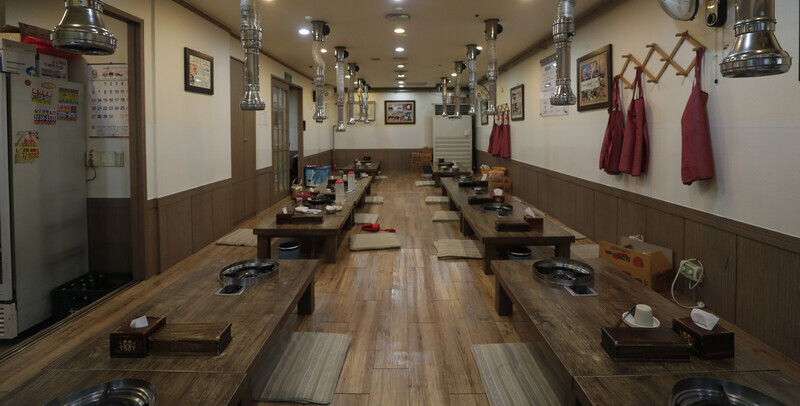hankyoreh
Links to other country sites 다른 나라 사이트 링크
S. Korea to begin commercial mass production of antibody treatments for COVID-19

South Korea’s disease control authorities announced plans to begin commercial mass production of antibody treatments for COVID-19 this month. Its decision to carry out commercial production in tandem with clinical trials for the domestically produced treatment appears to be based on the inability to predict when the pandemic will be “over.” While the virus’s resurgence in South Korea has abated somewhat with daily caseloads falling below 200 for six consecutive days, the number of infection clusters has been rising.
Speaking in a regular briefing on Sept. 8, Korea Centers for Disease Control and Prevention (KCDC) Deputy Director Kwon Jun-wook said, “Phase II and III clinical trials for a COVID-19 antibody treatment are currently under review by the Ministry of Food and Drug Safety [MFDS], and we are planning for commercial mass production of the antibody treatment within the month of September.”
To develop the antibody treatment, specific components of the coronavirus antibodies collected from the blood of recovered patients are cultured to produce a medication. While other medications typically receive usage approval only after Phase III clinical trials are complete, Kwon explained that the COVID-19 antibody treatment is undergoing clinical trials and commercial production simultaneously.
Phase III clinical trials for the domestically produced antibody treatment, which is being developed by Celltrion, are expected to finish around May of next year. The company explained, “With the performance and stability having been demonstrated in Phase II and Phase III, we are beginning mass production so that we can commence with sales immediately upon emergency or regular usage approval from the MFDS.”
Kwon said, “We’re looking forward to achieving a maximally safe and effective COVID-19 vaccine before the Chuseok holiday next year, but vaccine development takes a long time and requires monitoring for side effects.”
“We will do our best to develop and prepare a strategy for efficient progress as well as safety,” he added.
Daily caseload falls below 200 for six straight days, but infection clusters still on the riseSouth Korea reported 136 new cases at 12 am on Sept. 9, marking the sixth straight day since Sept. 3 that the daily caseload fell below 200. While the rise in new cases has abated somewhat, the number of infection clusters throughout South Korea was five times higher than in early August. Between Aug. 23 and Sept. 5, a total of 52 infection clusters were confirmed in South Korea.
Additional clusters were confirmed on Sept. 8 at a Buddhist mission and Catholic church. The city of Seoul announced that day that 12 monks and others at a Nichiren Shoshu mission in the Yeongdeungpo District had tested positive for the virus. Nichiren Shoshu is a Japanese branch of Buddhism. A congregation member also tested positive at Susaek Catholic Church in Seoul’s Eunpyeong District, bringing the total number of confirmed cases associated with the church to four since the first was diagnosed on Sept. 6. The city plans to propose that the central government impose the same ban on in-person Buddhist services and Catholic masses that it currently applies only to services at Protestant churches.
“We see this measure as quite necessary,” KCDC said.
As of 2 pm on Sept. 8, the city of Seoul also restricted the public’s access to heavily frequented areas, including the Han River parks at Yeouido, Ttukseom, and Banpo. The measure was taken in response to a rapid “ballooning” of visits to the Han River parks following a ban on indoor food and beverage consumption at restaurants and bars in the Seoul Capital Area (SCA) after 9 pm. Stores and coffee shops in all Han River parks will be required to close at 9 pm, and vehicles will not be allowed to enter parking facilities.
By Kim Min-je, Park Da-hae, and Seo Hye-mi, staff reporters
Please direct comments or questions to [english@hani.co.kr]

Editorial・opinion
![[Editorial] Japan’s rewriting of history with Korea has gone too far [Editorial] Japan’s rewriting of history with Korea has gone too far](https://flexible.img.hani.co.kr/flexible/normal/500/300/imgdb/original/2024/0422/1717137715201877.jpg) [Editorial] Japan’s rewriting of history with Korea has gone too far
[Editorial] Japan’s rewriting of history with Korea has gone too far![[Column] The president’s questionable capacity for dialogue [Column] The president’s questionable capacity for dialogue](https://flexible.img.hani.co.kr/flexible/normal/500/300/imgdb/original/2024/0422/1517137717613239.jpg) [Column] The president’s questionable capacity for dialogue
[Column] The president’s questionable capacity for dialogue- [Column] Are chaebol firms just pizza pies for families to divvy up as they please?
- [Column] Has Korea, too, crossed the Rubicon on China?
- [Correspondent’s column] In Japan’s alliance with US, echoes of its past alliances with UK
- [Editorial] Does Yoon think the Korean public is wrong?
- [Editorial] As it bolsters its alliance with US, Japan must be accountable for past
- [Guest essay] Amending the Constitution is Yoon’s key to leaving office in public’s good graces
- [Editorial] 10 years on, lessons of Sewol tragedy must never be forgotten
- [Column] A death blow to Korea’s prosecutor politics
Most viewed articles
- 1Korean government’s compromise plan for medical reform swiftly rejected by doctors
- 2[Column] The clock is ticking for Korea’s first lady
- 3[Editorial] Japan’s rewriting of history with Korea has gone too far
- 4[Column] The president’s questionable capacity for dialogue
- 5Samsung barricades office as unionized workers strike for better conditions
- 6[Reporter’s notebook] Did playing favorites with US, Japan fail to earn Yoon a G7 summit invite?
- 7All eyes on Xiaomi after it pulls off EV that Apple couldn’t
- 8[Interview] “We are in a revolutionary moment”: Art is expanding in the AI era, says scholar
- 9[Column] Are chaebol firms just pizza pies for families to divvy up as they please?
- 10Korea protests Japanese PM’s offering at war-linked Yasukuni Shrine